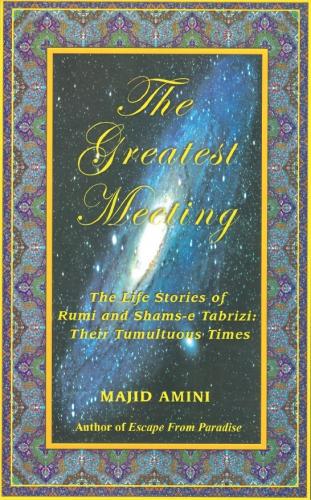The Greatest Meeting
The Life Stories of
Rumi and Shams-e Tabrizi:
Their Tumultuous Times.
MAJID AMINI
Author of Escape from Paradise
ALSO BY:
MAJID AMINI
Escape from Paradise
Dreams of a Native Son
The Howling Leopard
The Sunset Drifters
Bibi’s Rainbow
Children of a Lesser Nation
THE GREATEST MEETING
Copyright © 2004 by Majid Amini
All rights reserved
Published in eBook format by eBookIt.com
ISBN-13: 978-1-4566-0456-1
No part of this book may be used or reproduced in any manner whatsoever without written consent except in the case of brief quotations embodied in critical articles or reviews.
For information, address:
Afsâneh Publishing Company
760 Calle Plano
Camarillo, CA 93012
Tel: (805) 482-5200
Fax:(805) 482-5252
The cataloging-in-publication data is on file with the Library of Congress.
The Greatest Meeting / Majid Amini. – 1st edition.
ISBN 1-877789-04-6
Second Edition, First Edition January 2004
To Manzar, Molky Jahân, Hussein, Tubâ,
Hamid, Masoud, and Bauback,
With my love
You’re the profundity of your own being,
The vast sea of your own life;
For if there’s any depth in this sea,
It’s in you.
………………………………………
The entire world is within you.
He who knows himself can comprehend the whole.
…………………………………………..
The purpose of this world’s existence was,
The meeting of two friends,
To sit across each other,
But in the direction of God,
Apart from their own needs and desires!
……………………………………….
I was seeking for someone weaved from the same fabric,
To make him my altar, to face him, for I was weary of myself!
What would you understand from these words when I say: “I was weary of myself?!”
Now, since I made him (Rumi) my altar,
Whatever I utter, he comprehends, and absorbs.
Shams-e Tabrizi
Acknowledgments
I am indebted and grateful to my wife, Manzar, who nourished my sense of curiosity by presenting me with a book on Shams-e Tabrizi, rekindled and nurtured the desire in me to write the story in 1999, and offered her encouragement at critical moments; to my late brother, Hamid, who first introduced me to Rumi; to my rare intellectual and curious friend, Hussein Zahedi, who provided material and generously shared his invaluable wisdom with me; to my brother, business partner, and cherished reader, Mantosh Chawla, who never denied me his support; to my kind school-years friend, Ali Malekzadeh, whose help and encouragement had never diminished during the past forty years, and to Dr. Hooman Madyoon, my cheerleader.
My special thanks and gratitude to Catherine Wermuth, whose hard work, patience, and meticulous skill of copyediting made this book possible; and to Bette Darwin for taking time to read the manuscript and offering her valuable comments and suggestions.
Foreword
Devoting an in-depth discussion regarding the Erfân, Tasavvof, and Sufigary, which in the West, are often collectively referred to as Mysticism, Gnosticism, Sufism, or sometimes Dervishes’ thoughts, would have been beyond the scope of this book. Among the numerous books that have appeared in the West in the past few decades (mostly the translations of Rumi poetry, or a few scholarly works), one cannot find a clear and convincing definition for these schools of thought. Even if there has been any sporadic attempt to define Mysticism, these efforts are vague, abstract, or expressed in languages in which their meanings cannot be easily discerned from the context of the subjects that were not clearly defined by the founders of this thought. Therefore, a brief definitions for these school of thought, or religious and social movement that had the potential to change the fabric of Islam, at least in Persia (Iran) and possibly elsewhere, would definitely assist the reader in a better understanding this book.
Numerous definitions for Gnosticism, Erfân, can be observed from the original founders and torch holders of this form of thought from early years of Islam and onward. Perhaps an acceptable definition is: “Possessing intellectual or esoteric knowledge of spiritual things.” But perhaps Hâfez, the renowned Persian poet of the eighth century, defines Erfân the best in one of his verses.
“There’s only one relevant point,
In the sorrow of eshgh, love,
And surprisingly,
From whomever’s tongue I hear that point,
It is utterly unrepeatable.”
The essence of Erfân is an inner personal experience, a mental transformation, a metamorphosing process, a special feeling of being connected to a higher being, and to beings in the universe. It is a sentiment of closeness, connection, and oneness with each and all other beings that one experiences. It is an ambiguous and secretive realization, a feeling of self-actualization that an individual senses, which is not expressible or transferable to another person. It would perhaps be acceptable to articulate that this kind of experience creates a relationship with life and the process of living that cannot be expressed otherwise. But an Âref, a gnostic person, is naturally receptive to this experience and understands it wholeheartedly. It may also shine more light on this complex and, to some degree abstract form of thinking, if one would relate to what Yung, the Swiss psychologist, describes as, “Establishing a momentary connection with one’s subconscious.” It is then that this connection would open a vast horizon to that individual’s vision. The person who attains such an inner experience reaches an almost supernatural level of peace and tranquility, void of any malice, hatred and violence towards all beings, and he lives in harmony and serenity with himself and his surrounding world. In other words, this person’s relationship with the world and everything in it would be based on the eshgh, love. He embraces all the world’s events and challenges related to living things with a peaceful and a healthy attitude, for he can clearly see the casting shadow of a higher wisdom on this world. Thus, he lives a fulfilled, joyous,
